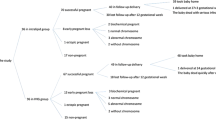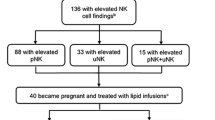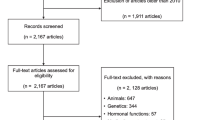Abstract
The regulation of uterine and peripheral blood natural killer (NK) cells has been associated with problems related to reproductive immunology such as recurrent pregnancy loss (RPL), implantation failure or preeclampsia. NKp46, one of the natural cytotoxicity receptors (NCRs), is a unique marker that functions in NK cell cytotoxicity and cytokine production. Expression of NKp46 on NK cells is lower in women with recurrent pregnancy loss and pregnancy-induced hypertension. Moreover, expression of NKp46 on peritoneal fluid NK cells is lower in women with pelvic endometriosis. Therefore, evaluation of NKp46 on peripheral blood NK cells may provide a means of screening for reproductive abnormalities. Recently, a new type of NK cell, the NK22 cell, has been reported. This cell may be a regulator not only of the mucosal barrier but also of reproduction.For women with RPL showing abnormal uterine and/or peripheral blood NK cells, both intravenous immunoglobulin treatment and intralipid treatment have been reported. The effects of these treatments are still controversial, and further studies are needed in order to clarify their true impact. The present review examines variations in the expression of NCRs on NK cells, the participation of NK22 cells in reproduction, and the possible use of intravenous immunoglobulin or intralipid treatment for women with recurrent pregnancy loss and NK cell abnormality.


Similar content being viewed by others
References
Norwitz ER, Schust DJ, Fisher SJ. Implantation and the survival of early pregnancy. N Engl J Med. 2001;345:1400–8.
Moffett A, Regan L, Braude P. Natural killer cells, miscarriage, and infertility. BMJ. 2004;329:1283–5.
Bhalla A, et al. Comparison of the expression of human leukocyte antigen (HLA)-G and HLA-E in women with normal pregnancy and those with recurrent miscarriage. Reproduction. 2006;131:583–9.
Katano K, et al. Peripheral natural killer cell activity as a predictor of recurrent pregnancy loss: a large cohort study. Fertil Steril. 2013;100:1629–34.
Tang AW, Alfirevic Z, Quenby S. Natural killer cells and pregnancy outcomes in women with recurrent miscarriage and infertility: a systematic review. Hum Reprod. 2011;26:1971–80.
Kwak-Kim J, Gilman-Sachs A. Clinical implication of natural killer cells and reproduction. Am J Reprod Immunol. 2008;59:388–400.
Kwak JY, et al. Up-regulated expression of CD56+, CD56+/CD16+, and CD19+ cells in peripheral blood lymphocytes in pregnant women with recurrent pregnancy losses. Am J Reprod Immunol. 1995;34:93–9.
Coulam CB, et al. Systemic CD56+ cells can predict pregnancy outcome. Am J Reprod Immunol. 1995;33:40–6.
Fukui A, et al. Natural killer cell subpopulations and cytotoxicity for infertile patients undergoing in vitro fertilization. Am J Reprod Immunol. 1999;41:413–22.
Fukui A, et al. Expression of natural cytotoxicity receptors and a2V-ATPase on peripheral blood NK cell subsets in women with recurrent spontaneous abortions and implantation failures. Am J Reprod Immunol. 2006;56:312–20.
Fukui A, et al. Intracellular cytokine expression of peripheral blood natural killer cell subsets in women with recurrent spontaneous abortions and implantation failures. Fertil Steril. 2008;89:157–65.
Fukui A, et al. Expression of natural cytotoxicity receptors and intracellular cytokine production of natural killer cell subsets in women with implantation failures. J Fertil Implant. 2009;26:341–7.
Fukui A, et al. Correlation between natural cytotoxicity receptors and intracellular cytokine expression of peripheral blood NK cells in women with recurrent pregnancy losses and implantation failures. Am J Reprod Immunol. 2009;62:371–80.
Fukui A, et al. Expression of natural cytotoxicity receptors on midsecretory endometrial or decidual natural killer cells. J Fertil Implant. 2010;27:369–74.
Fukui A, et al. Uterine and circulating natural killer cells and their roles in women with recurrent pregnancy loss, implantation failure and preeclampsia. J Reprod Immunol. 2011;90:105–10.
Chernyshov VP, et al. Elevated NK cell cytotoxicity, CD158a expression in NK cells and activated T lymphocytes in peripheral blood of women with IVF failures. Am J Reprod Immunol. 2010;64:58–67.
Junovich G, et al. Endometrial CD16(+) and CD16(−) NK cell count in fertility and unexplained infertility. Am J Reprod Immunol. 2013;70:182–9.
Lachapelle MH, et al. Endometrial T, B, and NK cells in patients with recurrent spontaneous abortion. Altered profile and pregnancy outcome. J Immunol. 1996;156:4027–34.
Arnon TI, et al. Recognition of viral hemagglutinins by NKp44 but not by NKp30. Eur J Immunol. 2001;31:2680–9.
Mandelboim O, et al. Recognition of haemagglutinins on virus-infected cells by NKp46 activates lysis by human NK cells. Nature. 2001;409:1055–60.
Halfteck GG, et al. Enhanced in vivo growth of lymphoma tumors in the absence of the NK-activating receptor NKp46/NCR1. J Immunol. 2009;182:2221–30.
Lakshmikanth T, et al. NCRs and DNAM-1 mediate NK cell recognition and lysis of human and mouse melanoma cell lines in vitro and in vivo. J Clin Invest. 2009;119:1251–63.
Cagnano E, et al. Expression of ligands to NKp46 in benign and malignant melanocytes. J Invest Dermatol. 2008;128:972–9.
Yokota M, et al. Role of NKp46 expression in cytokine production by CD56-positive NK cells in the peripheral blood and the uterine endometrium. Am J Reprod Immunol. 2013;69:202–11.
Sivori S, et al. p46, a novel natural killer cell-specific surface molecule that mediates cell activation. J Exp Med. 1997;186:1129–36.
Manaster I, et al. Endometrial NK cells are special immature cells that await pregnancy. J Immunol. 2008;181:1869–76.
Zhang Y, et al. Expressions of natural cytotoxicity receptors and NKG2D on decidual natural killer cells in patients having spontaneous abortions. Fertil Steril. 2008;90:1931–7.
Fukui A. NK cells and its role in reproduction. Am J Reprod Immunol. 2010;64:1.
Fukui A. Uterine and circulating natural killer cells and their roles in women with recurrent pregnancy losses, implantation failures or preeclampsia. J Reprod Immunol. 2010;86:14.
Fukui A, et al. Changes of NK cells in preeclampsia. Am J Reprod Immunol. 2012;67:278–86.
Moore Simas TA. Angiogenic factors for the prediction of preeclampsia in high-risk women. Am J Obstet Gynecol. 2007;197(244):e1–8.
Poon LC, et al. First-trimester prediction of hypertensive disorders in pregnancy. Hypertension. 2009;53:812–8.
Funamizu A, et al. Expression of natural cytotoxicity receptors on peritoneal fluid natural killer cell and cytokine production by peritoneal fluid natural killer cell in women with endometriosis. Am J Reprod Immunol. 2014;71:359–67.
Cella M, et al. A human natural killer cell subset provides an innate source of IL-22 for mucosal immunity. Nature. 2009;457:722–5.
Colonna M. Interleukin-22-producing natural killer cells and lymphoid tissue inducer-like cells in mucosal immunity. Immunity. 2009;31:15–23.
Veiga-Fernandes H, Kioussis D, Coles M. Natural killer receptors: the burden of a name. J Exp Med. 2010;207:269–72.
Yang X, Zheng SG. Interleukin-22: a likely target for treatment of autoimmune diseases. Autoimmun Rev. 2014;13:615–20.
Brosnahan MM, et al. IL-22 is expressed by the invasive trophoblast of the equine (Equus caballus) chorionic girdle. J Immunol. 2012;188:4181–7.
Ghadially H, et al. NKp46 regulates allergic responses. Eur J Immunol. 2013;43:3006–16.
Wang Y, et al. IL-22 secreted by decidual stromal cells and NK cells promotes the survival of human trophoblasts. Int J Clin Exp Pathol. 2013;6:1781–90.
Kamoi M, et al. NK22 cells in the uterine mid-secretory endometrium and peripheral blood of women with recurrent pregnancy loss and unexplained infertility. Am J Reprod Immunol. 2015. doi:10.1111/aji.12356.
Ata B, et al. A systematic review of intravenous immunoglobulin for treatment of unexplained recurrent miscarriage. Fertil Steril. 2011;95(1080–5):e1–2.
Polanski LT, et al. Interventions to improve reproductive outcomes in women with elevated natural killer cells undergoing assisted reproduction techniques: a systematic review of literature. Hum Reprod. 2014;29:65–75.
Heilmann L, Schorsch M, Hahn T. CD3-CD56+CD16+ natural killer cells and improvement of pregnancy outcome in IVF/ICSI failure after additional IVIG-treatment. Am J Reprod Immunol. 2010;63:263–5.
Shimada S, et al. A high dose of intravenous immunoglobulin increases CD94 expression on natural killer cells in women with recurrent spontaneous abortion. Am J Reprod Immunol. 2009;62:301–7.
Aoki K, et al. Preconceptional natural-killer-cell activity as a predictor of miscarriage. Lancet. 1995;345:1340–2.
Hadinedoushan H, Mirahmadian M, Aflatounian A. Increased natural killer cell cytotoxicity and IL-2 production in recurrent spontaneous abortion. Am J Reprod Immunol. 2007;58:409–14.
Perricone R, et al. High levels of peripheral blood NK cells in women suffering from recurrent spontaneous abortion are reverted from high-dose intravenous immunoglobulins. Am J Reprod Immunol. 2006;55:232–9.
Katano K, et al. Clinical trial of immunostimulation with a biological response modifier in unexplained recurrent spontaneous abortion patients. J Clin Immunol. 1997;17:472–7.
Ndukwe G. Recurrent embryo implantation failure after in vitro fertilisation: improved outcome following intralipid infusion in women with elevated T Helper 1 response. Hum Fertil (Camb). 2011;14:131–46 Abstracts.
Shreeve N, Sadek K. Intralipid therapy for recurrent implantation failure: new hope or false dawn? J Reprod Immunol. 2012;93:38–40.
Granato D, et al. Effects of parenteral lipid emulsions with different fatty acid composition on immune cell functions in vitro. JPEN J Parenter Enteral Nutr. 2000;24:113–8.
Roussev RG, et al. Duration of intralipid’s suppressive effect on NK cell’s functional activity. Am J Reprod Immunol. 2008;60:258–63.
Roussev RG, Ng SC, Coulam CB. Natural killer cell functional activity suppression by intravenous immunoglobulin, intralipid and soluble human leukocyte antigen-G. Am J Reprod Immunol. 2007;57:262–9.
Coulam CB, Acacio B. Does immunotherapy for treatment of reproductive failure enhance live births? Am J Reprod Immunol. 2012;67:296–304.
Disclosures
Conflict of interest
Atsushi Fukui, Mai Kamoi, Ayano Funamizu, Kohei Fuchinoue, Hitomi Chiba, Megumi Yokota, Rie Fukuhara and Hideki Mizunuma declare that they have no conflict of interest.
Human rights statements and informed consent
All procedures followed were in accordance with the ethical standards of the responsible committee on human experimentation (institutional and national) and with the Helsinki Declaration of 1964 and its later amendments. Informed consent was obtained from all patients for being included in the study.
Animal rights
This article does not contain any studies with animal subjects performed by any of the authors.
Author information
Authors and Affiliations
Corresponding author
About this article
Cite this article
Fukui, A., Kamoi, M., Funamizu, A. et al. NK cell abnormality and its treatment in women with reproductive failures such as recurrent pregnancy loss, implantation failures, preeclampsia, and pelvic endometriosis. Reprod Med Biol 14, 151–157 (2015). https://doi.org/10.1007/s12522-015-0207-7
Received:
Accepted:
Published:
Issue Date:
DOI: https://doi.org/10.1007/s12522-015-0207-7




